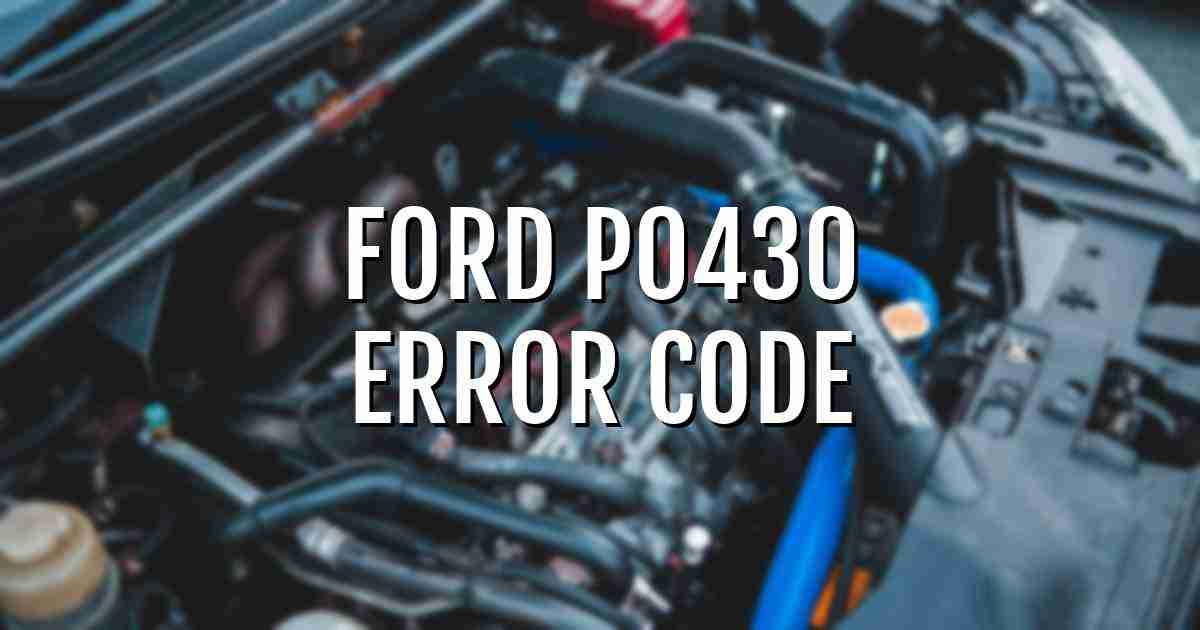The OBD code P0430 for Ford indicates an issue with the Threeway Catalyst Converter Bank 2. Symptoms include the Engine Light being ON.
Causes may include faulty components like the catalyst converter, oxygen sensor, or fuel injectors.
This code is serious as it affects emissions.
A possible fix is to inspect and potentially replace faulty components and check wiring connections for damage.
| Repair Importance Level | 6.67 (Out of 10) |
| Estimated Repair Time | Approximately 1.0 hour |
| Repair Difficulty Level | 6.67 (Out of 10) |
Symptoms of the Ford p0430 OBD Code
The vehicle may exhibit decreased fuel efficiency and a check engine light with code P0430.
- Symptoms: Check Engine Light ON.
- Decreased fuel efficiency.
- Rattling noise from the exhaust system.
- Vehicle may hesitate or lack power during acceleration.
Causes of the Ford p0430 OBD Code
P0430 in Ford vehicles indicates a malfunction in the catalytic converter efficiency for bank 2.
Do you know you can clear most fault codes—but some could mean serious danger? Don’t take chances with your safety or your family’s safety. This budget-friendly car scanner makes it easy to clear fault codes in seconds while showing you exactly what’s wrong. Plug it in, connect to your Android or iOS phone, and instantly check live data. You’ll know if it’s a minor issue you can clear or something serious that needs attention—so you can drive safely and stress-free. (Today’s Deal)
- P0430 can be caused by a Faulty Threeway Catalyst Converter Bank 2.
- An Exhaust Tube with leaks.
- Intake Air Leaks in the system.
- A Faulty Oxygen (O2) Sensor.
- Faulty Fuel injector(s) in the engine.
- Leaking Fuel Injector(s) causing issues.
- Faulty Spark plugs not igniting properly.
- Improper Ignition Timing affecting combustion.
- A Faulty Engine Control Module (ECM) not managing the system correctly.
- A Dirty Air Filter restricting airflow.
Fixing Ford Error Code p0430 Step By Step
Addressing a potential issue with the catalytic converter efficiency for Ford P0430 involves diagnosing and repairing exhaust system components.
- To fix the Ford OBDII code P0430, start by reviewing the possible causes related to the catalytic converter efficiency.
- Visually inspect the exhaust system for any leaks or damage.
- Check the oxygen sensors’ operation and wiring for proper function.
- Test the catalytic converter for efficiency using a scan tool or exhaust gas analyzer.
- Replace the catalytic converter if it fails the efficiency test.
- Clear the fault code and perform a road test to ensure the repair was successful.
Cost Of Fixing Ford p0430 Fault Code
The repair for Ford P0430 typically involves replacing the catalytic converter or addressing exhaust leaks.
The cost to diagnose and fix the Ford OBD code P0430 typically ranges from $75 to $150 per hour for labor rates.
With an estimated repair time of 1. 0 hour, the total cost can be around $75 to $150, depending on shop rates and the complexity of the issue.
That fault code is a turning point. If repair costs are climbing and your current loan feels like it’s holding you back, this is the time to plan ahead. The free Car Loan Payment Tracker helps you see how quickly you can pay off what’s left—and start preparing, with confidence, for your dream car.
Details of the Ford p0430 OBD Code
The Ford P0430 code indicates a catalyst system efficiency below threshold in bank 2.
Code P0430 for Ford vehicles indicates that the catalytic converter efficiency for bank 2 is below threshold.
This means that the catalytic converter is not effectively reducing emissions as it should.
The ECM triggers this code by monitoring the downstream oxygen sensor’s signal.
If the downstream oxygen sensor’s signal is too similar to the upstream oxygen sensor’s signal, it indicates that the catalytic converter is not working efficiently.
This code is specific to the catalytic converter on bank 2 of the engine.
Mechanic’s Tech Notes
Detailed information on diagnosing and repairing Ford code P0430 related to catalyst system efficiency below threshold (bank 2).
To diagnose and fix OBDII code P0430 on a Ford, start by checking the oxygen sensor’s operation using a scan tool.
Monitor the sensor’s voltage readings to ensure it’s functioning correctly.
Next, inspect the exhaust system for leaks or damage that could be causing inefficient catalytic converter operation.
Use a voltmeter to test the oxygen sensor’s heater circuit for proper voltage supply.
Additionally, perform a back pressure test to check for any exhaust restrictions that may be affecting the catalytic converter’s efficiency.
If all these tests check out, consider replacing the catalytic converter as it may be failing.
FAQ
Common causes of OBD code P0430 in a Ford vehicle include a faulty threeway catalyst converter Bank 2, exhaust tube, intake air leaks, faulty oxygen sensor, and improper ignition timing.
Diagnose P0430 in Ford: Check Bank 2 catalyst converter, exhaust, intake leaks, O2 sensor, fuel injectors, spark plugs, ignition timing, ECM. Inspect wiring and connectors for damage.
Driving with OBD code P0430 may not cause immediate damage, but it can lead to decreased fuel efficiency and emissions. Address promptly to prevent further issues.

Wrap Up
If your Ford is displaying OBD code P0430, you may notice decreased fuel efficiency, a rough idle, or a lack of power.
This code typically indicates a failing catalytic converter, faulty oxygen sensors, exhaust leaks, or engine misfires.
To address Ford OBD code P0430, start by inspecting the oxygen sensors, checking for exhaust leaks, and testing the catalytic converter’s efficiency.
Ensure the wiring harnesses are intact, connectors are secure, and there are no vacuum leaks in the system.
Consider replacing the catalytic converter if necessary.

